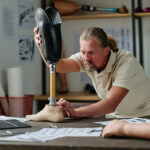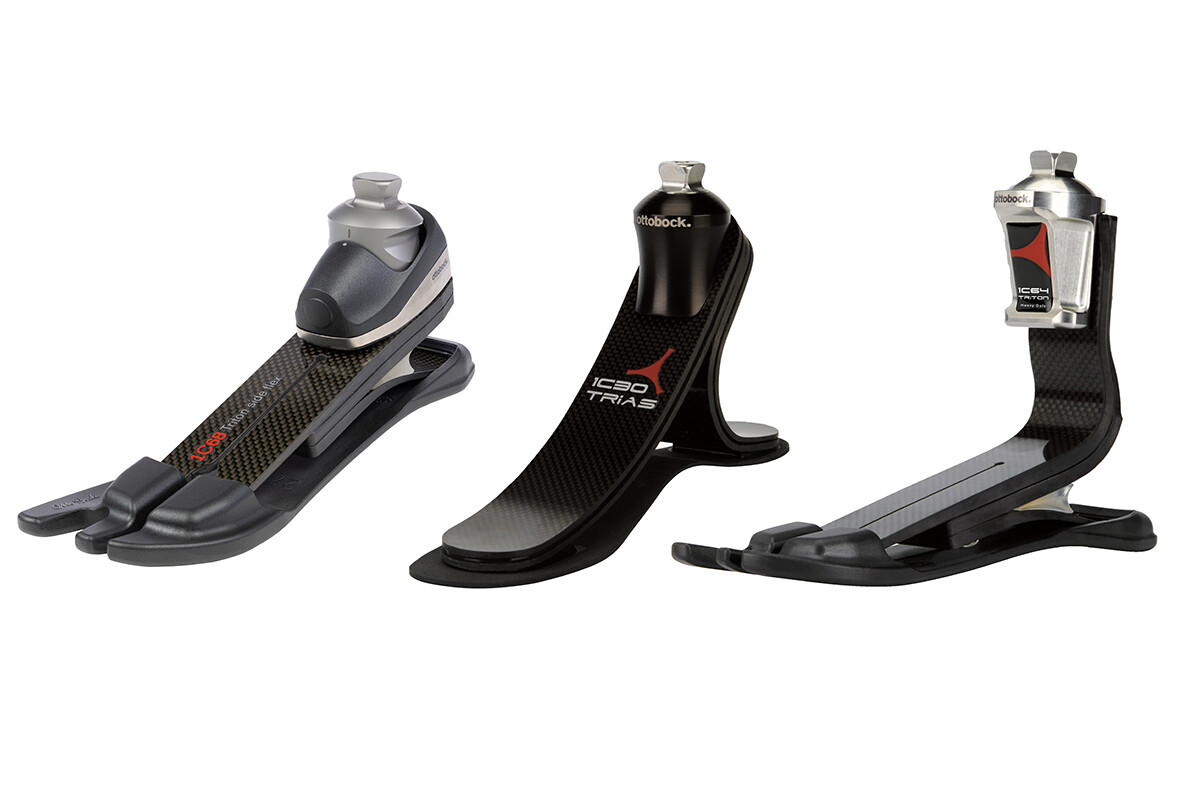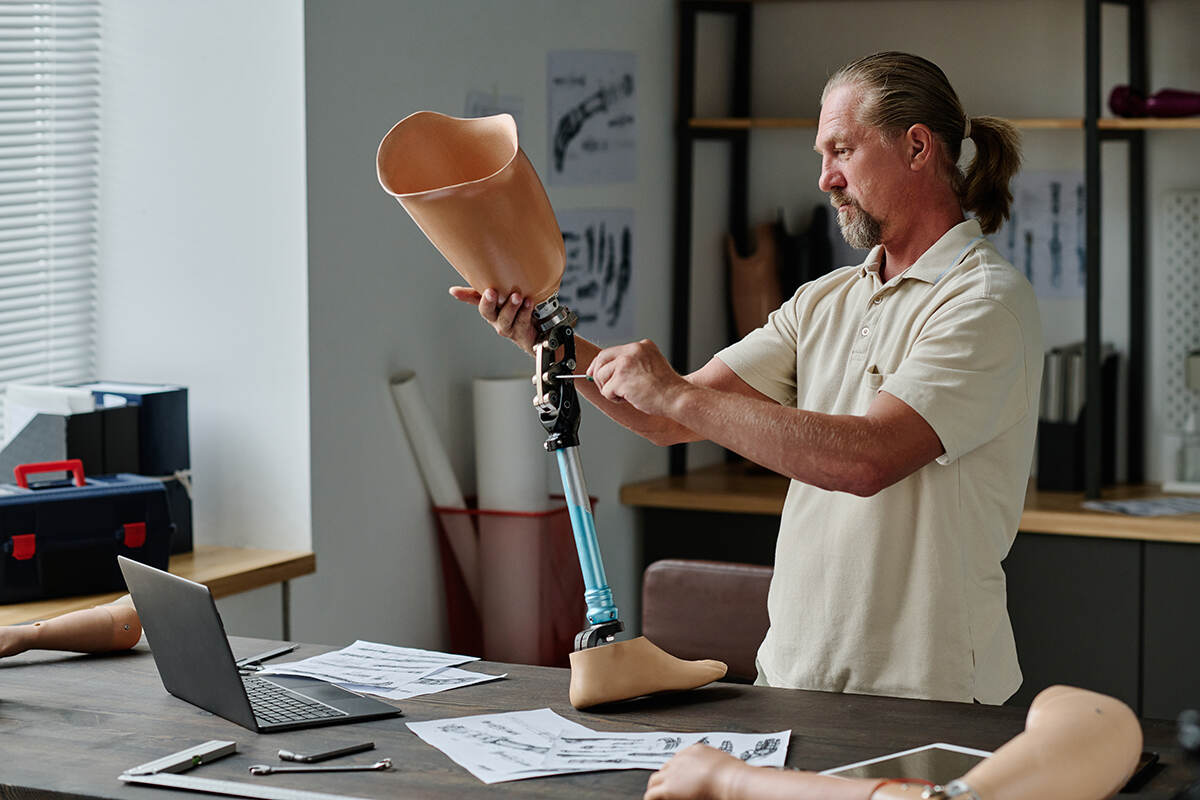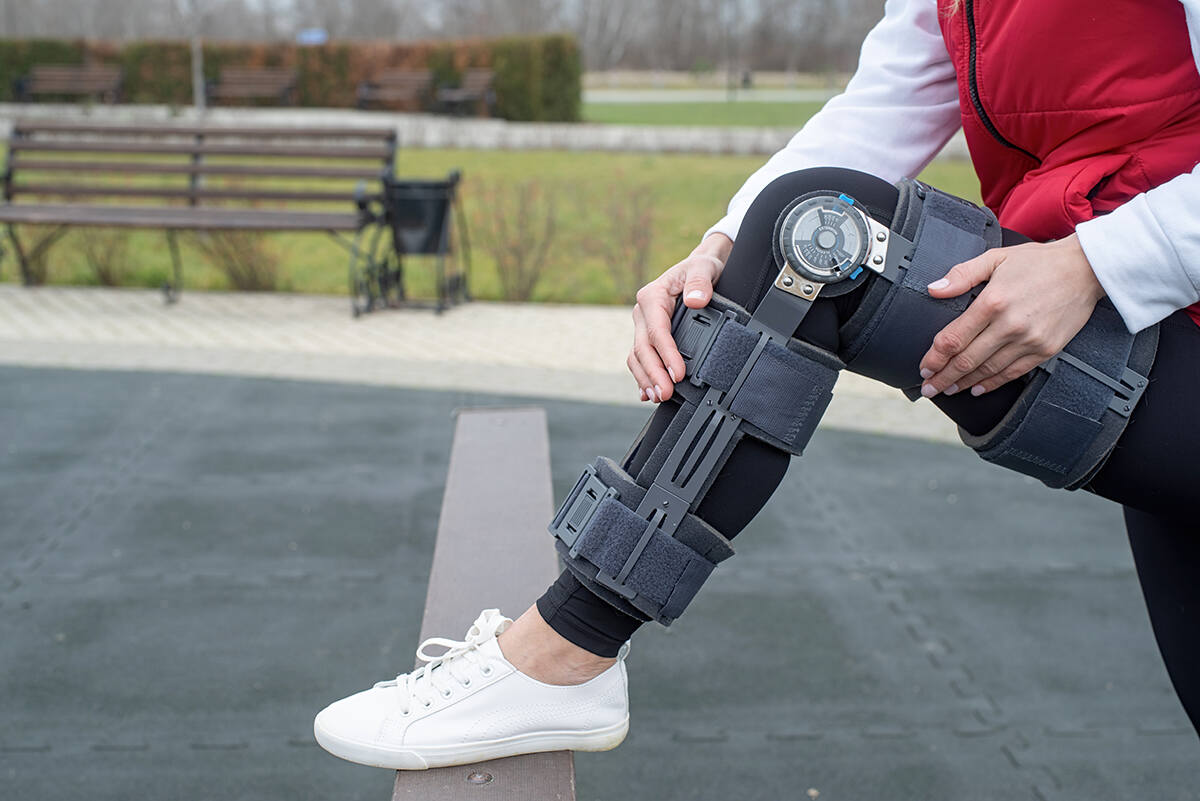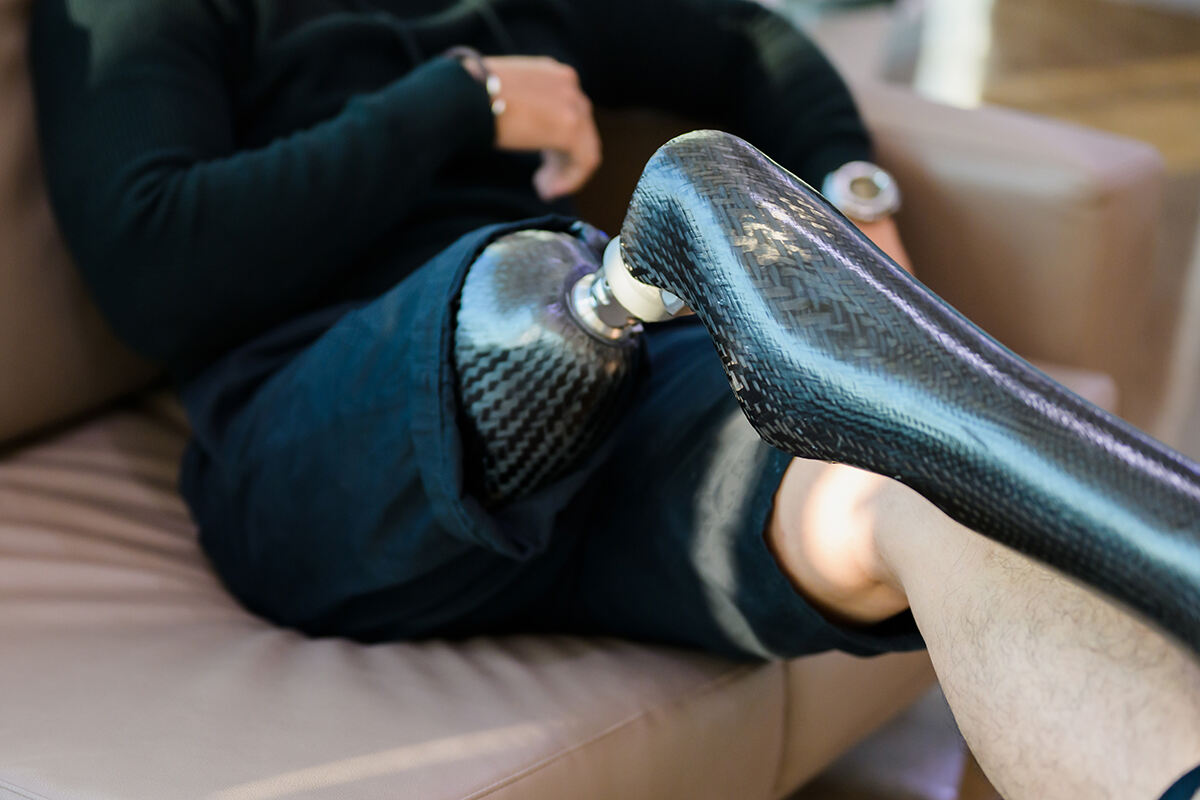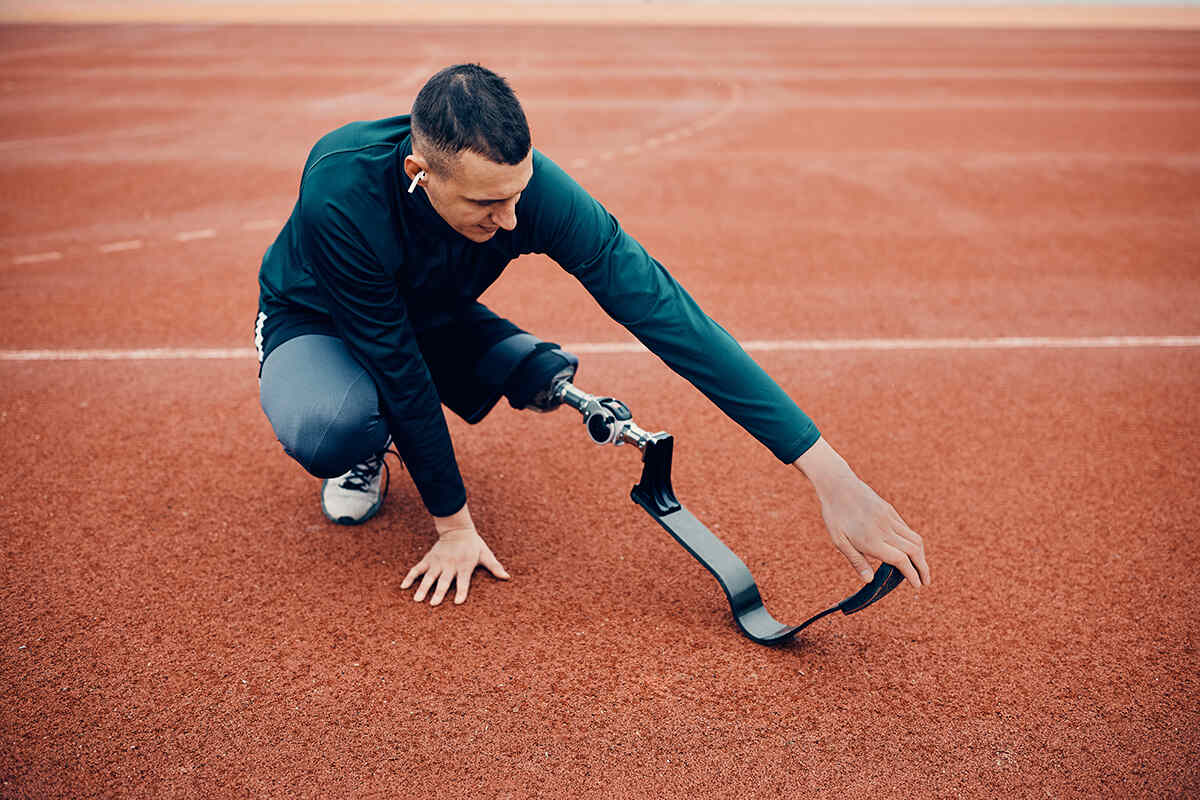The journey of transformation from adversity to triumph is often a testament to human resilience. This narrative finds compelling expression in the lives of individuals who, despite losing limbs, have chosen to rise above their circumstances through the aid of prosthetic technology. These inspiring people with prosthetic legs and arms, not only conquer their personal challenges but also inspire many others in their wake. This blog post explores the inspirational journeys of these individuals, the advancements in prosthetic technology, and how these devices have impacted their daily lives.
Key Takeaways
- Famous amputees, such as Alex Zanardi, Amy Purdy and Heather Mills have used their circumstances to inspire others.
Empowering Individuals with Prosthetic Legs
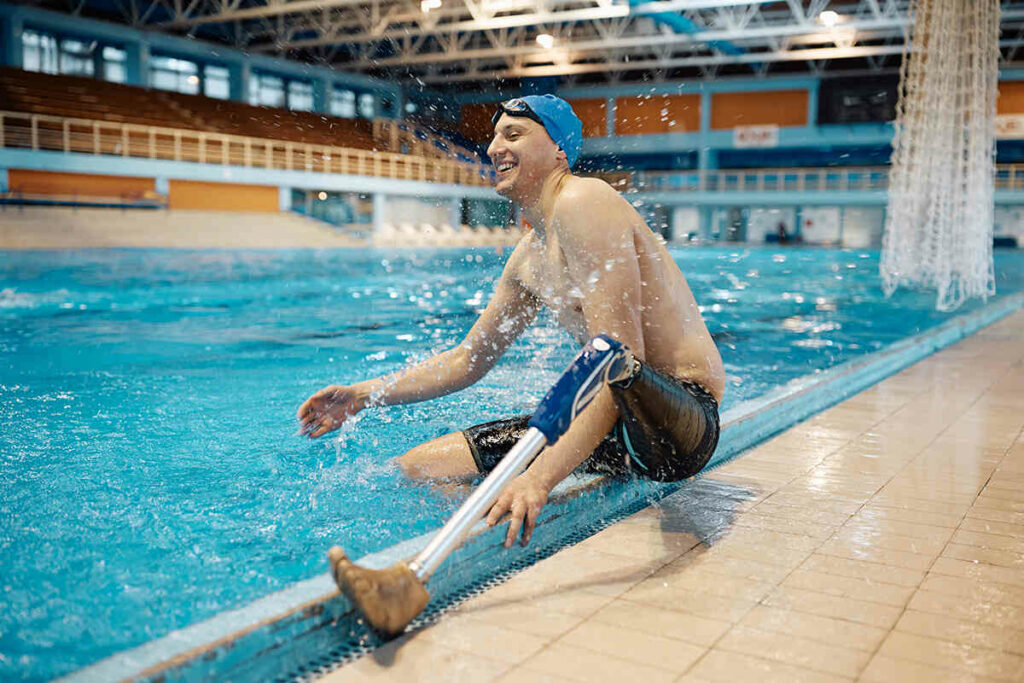
While life with a prosthetic leg presents challenges, it’s certainly not a life sentence. In fact, many individuals, including famous amputees like Alex Zanardi, Amy Purdy, and Heather Mills, have turned their trials into triumphs, using their circumstances as a stepping stone to inspire and empower others. These remarkable examples of resilience have achieved incredible feats despite the adversity of having a leg amputated, proving that even famous people lost limbs can still lead extraordinary lives.
In their journeys, these individuals have demonstrated that a prosthetic limb, such as a left arm, is not a symbol of loss, but rather a testament of resilience, a beacon of hope, and a tool of empowerment. They have redefined the notion of disability and rewritten their life stories, proving to the world that physical limitations cannot confine the human spirit.
Alex Zanardi
In the world of motorsport, few names resonate with the spirit of resilience and triumph like that of Alessandro “Alex” Zanardi. Born on October 23, 1966, in Bologna, Italy, Zanardi’s journey is not just about his remarkable achievements on the racetrack but also his indomitable spirit in the face of life’s most challenging adversities.
Zanardi’s early career in racing was a testament to his talent and determination. He quickly made a name for himself in the European racing circuits, leading to his entry into Formula One in the early 1990s. However, it was in the CART championship in the United States where Zanardi truly shone. His aggressive style, incredible overtakes, and charismatic personality made him a favorite among fans. He won the CART championship in 1997 and 1998, showcasing his exceptional skill and passion for the sport.
However, Zanardi’s life took a dramatic turn in 2001 during a CART race in Germany. A horrific crash resulted in the amputation of both his legs. For many, this would have been the end of their racing career, but Zanardi was not just anyone. His response to this life-altering event was nothing short of extraordinary. Showing immense courage and an unbreakable will, Zanardi not only returned to racing with specially modified cars but also turned his attention to a new challenge: Paralympic sports.
Zanardi took up hand cycling with the same zeal he had for racing cars. His dedication and hard work paid off spectacularly at the 2012 London Paralympics, where he won two gold medals and a silver, followed by another gold and silver at the 2016 Rio Paralympics. These victories were not just a personal triumph but also an incredible source of inspiration for people worldwide, demonstrating that physical limitations are not barriers to achieving greatness.
Beyond his sporting achievements, Zanardi’s positive attitude and infectious smile have made him a beloved figure. He has used his experience to motivate others, speaking about the power of positive thinking and the importance of facing challenges head-on. His autobiography, “My Sweetest Victory,” and numerous public appearances have touched the lives of many, spreading a message of hope and resilience.
Alex Zanardi’s story is a remarkable tale of human spirit and perseverance. His ability to overcome adversity, transform challenges into opportunities, and continue to pursue his passions is a testament to his character. He embodies the idea that with determination, courage, and a positive mindset, any obstacle can be turned into a stepping stone for success.
In the face of life’s unpredictability, Zanardi’s journey teaches us the power of resilience. His legacy extends far beyond the racetracks and Paralympic fields; it lies in the hearts of those he has inspired to face their challenges with a smile and an unwavering spirit. Alex Zanardi is not just a champion in sports; he is a champion of life, an enduring symbol of what it means to truly live without limits.
Amy Purdy
In a world where challenges can often seem insurmountable, Amy Purdy stands as a testament to the indomitable human spirit. Her story is not just one of overcoming adversity, but of redefining the possible, inspiring millions around the globe.
Born on November 7, 1979, in Las Vegas, Nevada, Amy’s life took an unexpected turn at the age of 19. She was diagnosed with bacterial meningitis, a life-threatening condition that led to the amputation of both her legs below the knee. While many would see this as a tragic end to their old life, Amy saw it as the beginning of a new journey.
Amy’s resilience in the face of adversity is nothing short of remarkable. Instead of succumbing to despair, she chose to embrace her new reality with courage and determination. Her passion for snowboarding, which she had cultivated since a young age, became the cornerstone of her recovery. Within just a year of her amputation, Amy was back on the slopes, this time on prosthetic legs. Her relentless pursuit of her passion led her to become a three-time Paralympic medalist, including a bronze in Sochi 2014 and a silver in Vancouver 2010.
But Amy’s influence extends far beyond the world of sports. She is a motivational speaker, a New York Times bestselling author, and a contestant on the popular TV show “Dancing with the Stars,” where she finished as a runner-up. Her performances on the show were not just dance routines; they were powerful statements about the strength and potential of the human spirit.
Amy’s journey is a vivid illustration of her philosophy that our limitations are largely self-imposed. She believes in living life without boundaries, a message she conveys through her speaking engagements and her book, “On My Own Two Feet.” Her story encourages others to see past their limitations, whether physical, mental, or circumstantial, and to pursue their dreams with relentless passion.
Her work as a motivational speaker and author has made her an influential figure in the world of disability advocacy and empowerment. She co-founded Adaptive Action Sports, a non-profit organization dedicated to introducing people with physical challenges to action sports. Through this initiative, Amy has helped countless individuals discover a new sense of freedom and self-confidence.
Amy’s life is a vibrant tapestry of triumphs, not despite her challenges, but because of them. Her story teaches us that the human spirit is capable of incredible resilience. She embodies the belief that with determination, courage, and a positive mindset, any obstacle can be transformed into a stepping stone towards greater heights.
In a world often clouded by negativity and doubt, Amy Purdy shines as a beacon of hope and inspiration. Her journey reminds us that life’s greatest challenges can also be its most profound opportunities for growth and transformation. As she gracefully dances through life’s ups and downs, Amy Purdy continues to inspire and uplift all who hear her story, proving that the only limits that truly exist are the ones we place on ourselves.
Heather Mills
Born in Aldershot, England, in 1968, Heather’s early life was far from easy. She faced numerous struggles, including a tumultuous family life and financial hardships. However, these challenges only served to forge her into a stronger individual, laying the groundwork for her later achievements.
The turning point in Heather’s life came in 1993, when she was involved in a collision with a police motorcycle, resulting in the amputation of her left leg below the knee. For many, such an event could have been a crushing blow, but for Heather, it was the beginning of a new chapter. Her recovery was marked by a remarkable display of courage and tenacity. She refused to let her disability define her or limit her potential.
Heather’s post-accident life has been a whirlwind of achievements and advocacy. She became heavily involved in charity work, focusing on helping amputees and advocating for animal rights. Her work in this field is not just philanthropic; it’s deeply personal. She understands the challenges faced by amputees and uses her experience to guide, inspire, and support others going through similar experiences.
One of Heather’s most notable contributions is her work with the Heather Mills Health Trust, which she founded in 2000. The trust recycles prosthetic limbs, providing them to amputees who cannot afford them, in countries like Croatia and Ghana. This initiative has changed countless lives, offering mobility and a new lease on life to many.
Beyond her charity work, Heather has also excelled in various personal endeavors. She has shown the world that physical limitations are not barriers to achieving greatness. As a testament to her athletic prowess, Heather became a member of the British Disabled Ski Team in 2010. Her dedication and skill in this demanding sport are nothing short of inspiring.
Heather’s life story is a powerful reminder of the human capacity for resilience. She has faced adversity head-on, transforming her challenges into opportunities for growth and service. Her journey resonates with anyone who has faced obstacles, offering a message of hope and the possibility of triumph over adversity.
Moreover, Heather’s activism in animal rights and environmental causes adds another layer to her inspirational profile. She advocates for a vegan lifestyle, not just as a personal choice, but as a way to contribute to a healthier planet and more humane treatment of animals. Her passion for these causes is infectious, encouraging others to consider the impact of their choices on the world around them.
Heather Mills exemplifies the idea that what truly defines us is not the challenges we face, but how we choose to respond to them. Her legacy is one of hope, resilience, and the enduring power of the human spirit.
Athletes Defying Limits with Prosthetic Legs
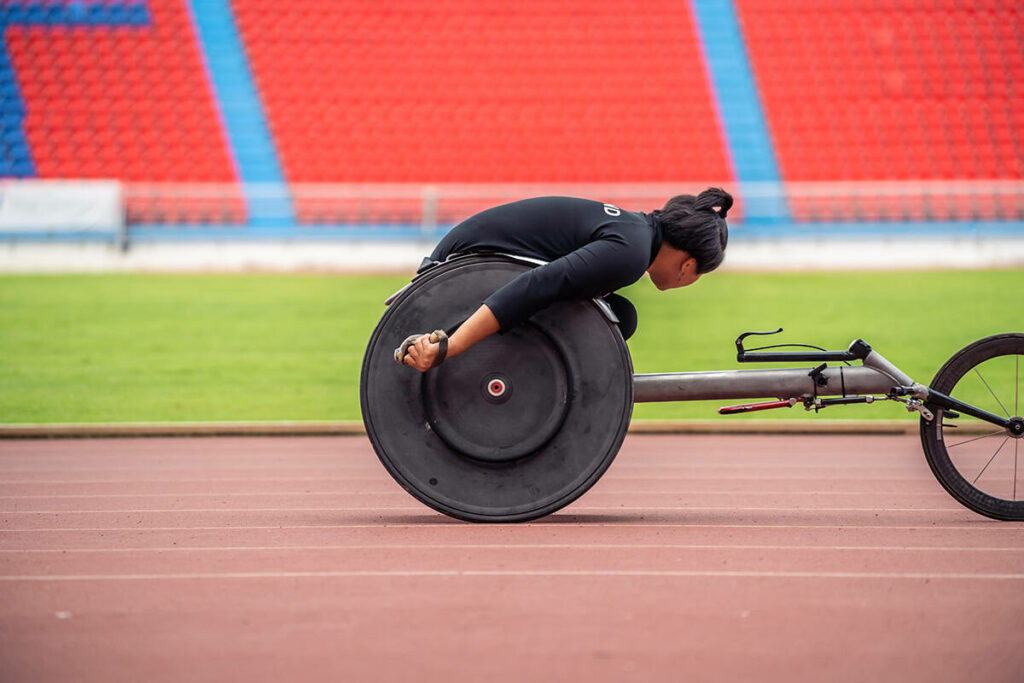
The world of sports has seen numerous athletes with prosthetic legs defying odds and achieving remarkable feats. Not only have these athletes shattered records on the track, but they have also dismantled barriers and stereotypes, inspiring countless others with their resolve and unyielding spirit.
Athletes like Oscar Pistorius, Aimee Mullins, and Blake Leeper have demonstrated that physical limitations do not define one’s capabilities. Their stories are a testament to the power of resilience and determination in overcoming obstacles and achieving success.
Oscar Pistorius
Oscar Pistorius, a name synonymous with both awe-inspiring athletic achievement and a tragic fall from grace, presents a complex story of resilience, controversy, and human frailty. His journey, marked by groundbreaking success on the track and a life-altering crime, offers a poignant reflection on the dualities of human nature.
Born on November 22, 1986, in Johannesburg, South Africa, Pistorius faced significant challenges from the outset. He was born with fibular hemimelia, a congenital absence of the fibula in both legs. At just 11 months old, he underwent a double amputation below the knees. However, this early adversity set the stage for a remarkable display of human spirit and determination.
Pistorius emerged as a paralympic icon, shattering records and defying expectations. Fitted with prosthetic blades, he earned the nickname “Blade Runner,” competing with extraordinary speed and grace. His most notable achievement was in the 2012 London Olympics, where he became the first amputee runner to compete against able-bodied athletes in the Olympic Games. This historic moment was not just a personal victory for Pistorius but a monumental step forward for athletes with disabilities worldwide, symbolizing the blurring of lines between ‘abled’ and ‘disabled’ sports.
However, Pistorius’ story took a dark turn in the early hours of Valentine’s Day in 2013. He fatally shot his girlfriend, Reeva Steenkamp, at his home in Pretoria. Pistorius claimed he mistook her for an intruder, but the prosecution argued it was a deliberate act. The incident sent shockwaves around the world, casting a shadow over his previous achievements.
In 2014, Pistorius was found guilty of culpable homicide, later overturned to murder in 2015. He was sentenced to six years in prison, a sentence that was subsequently increased to 13 years and five months after an appeal by the prosecution. The trial, fraught with emotional testimony and legal complexities, highlighted issues of gun violence and domestic abuse in South Africa.
The fall of Oscar Pistorius is a stark reminder of the complexities of human character. His story is not one of unblemished heroism, nor is it solely one of villainy. It’s a human story, filled with triumphs and failures. His athletic achievements brought hope and inspiration to many, particularly those facing physical challenges. Yet, his crime and its consequences remind us of the profound responsibilities that come with fame and the potential for downfall.
In reflecting on Pistorius’ life, it’s essential to acknowledge both his extraordinary contributions to sports and the tragic events that unfolded. His story serves as a powerful lesson on the potential for greatness within all individuals, regardless of physical limitations, and the equally present potential for grievous mistakes.
As we consider the legacy of Oscar Pistorius, it’s crucial to balance the narrative. We must celebrate the barriers he broke and the inspiration he provided to many, while also recognizing the gravity of his actions and their irreversible impact. His life story, a blend of remarkable achievement and profound tragedy, remains a compelling, albeit cautionary, tale of the heights of human potential and the depths of despair.
He was released from prison late 2023.
Aimee Mullins
In a world where physical perfection often seems like the ultimate goal, Aimee Mullins stands as a beacon of inspiration, challenging conventional perceptions of disability and beauty. Born with a medical condition that led to the amputation of both her legs below the knee, Mullins has transcended boundaries in athletics, modeling, and acting, redefining what it means to be differently-abled.
Aimee Mullins was born on July 20, 1976, in Allentown, Pennsylvania. Diagnosed with fibular hemimelia, she had both of her legs amputated below the knee when she was just a year old. This early challenge set the stage for a life of breaking barriers. With prosthetic legs, Mullins learned not just to walk but to run, eventually becoming a star athlete. In 1996, she made history at the Paralympics in Atlanta, where she competed in the 100-meter dash and the long jump, showcasing not just her athletic prowess but also the potential of prosthetic technology.
She has been a vocal advocate for redefining the narrative around disability. Her TED talks, where she speaks about the opportunity of adversity and the new era of prosthetics, have been viewed millions of times, inspiring people worldwide. Mullins challenges the notion that prosthetics should aim to replicate the appearance of biological limbs. Instead, she embraces them as a form of self-expression, a way to transcend human limitations.
Her foray into modeling and acting further shattered stereotypes. Mullins became a muse for fashion designer Alexander McQueen, walking the runway with intricately carved wooden prosthetic legs that were as much a work of art as they were functional. This appearance catapulted her into the public eye, challenging the fashion industry’s standards of beauty. Her acting career, which includes appearances in films and popular TV shows like “Stranger Things,” further proves that her talents are boundless.
Mullins’ journey is not just about overcoming adversity; it’s about redefining what’s possible. Her message is clear: our differences, whether physical, mental, or emotional, are not just to be accepted but celebrated. They are what make us unique, what give us the power to innovate and inspire.
In her words and actions, she embodies the idea that the only real disability is a crushed spirit..
Blake Leeper
Born with a congenital disability that led to the amputation of both his legs below the knee, Leeper has defied odds, stereotypes, and limitations to become one of the most remarkable Paralympic athletes of our time. His journey is a testament to the indomitable human spirit.
Blake Leeper’s story began in Kingsport, Tennessee, 1989. From the outset, he faced challenges that most of us could scarcely imagine. Yet, with the support of his loving family and a pair of prosthetic legs, he took his first steps into a life that would be marked by extraordinary determination and achievement.
From a young age, Leeper exhibited an unquenchable thirst for sports. He played basketball, ran track, and engaged in any activity that let him move and compete. His early years were not about winning medals but about proving something far more significant – that limitations exist only in the mind.
Leeper’s breakthrough came in high school when he started focusing on track and field. His talent was undeniable, and soon he was setting records and winning medals. But it wasn’t just his speed that caught the attention of the world; it was his unyielding positivity and infectious smile. Blake Leeper was not just running races; he was winning hearts.
The Paralympics became a natural stage for Leeper’s talents. He made his debut in 2012 at the London Paralympic Games, where he won silver and bronze medals. This achievement was more than a personal victory; it was a beacon of hope and inspiration for people with disabilities and a powerful message to the world about the potential within every individual.
Off the track, Leeper’s impact has been equally profound. He has become a motivational speaker, sharing his story with audiences around the globe, from school children to corporate executives. His message is universal: “No matter what you’re going through, your hardest days often lead to your greatest moments.”
Leeper’s journey has not been without its challenges. He has faced regulatory hurdles in his quest to compete against able-bodied athletes. Yet, in every setback, he has found strength, using each obstacle as a stepping stone to greater heights.
As we look at Blake Leeper’s life, it’s clear that he is more than an athlete. He is a symbol of resilience, a living example that limitations are but milestones waiting to be overcome. His story teaches us that with courage, determination, and a positive attitude, there are no heights that cannot be scaled.
Blake Leepers story is told in the film “Abled” released 2023.
In a world where challenges can seem insurmountable, the stories of Amy Purdy, Heather Mills, and Oscar Pistorius and many others shine as beacons of resilience and determination. Each of these remarkable individuals has turned a personal challenge into a triumph, redefining what it means to live with prosthetic legs.
Together, the individuals above embody the spirit of triumph over adversity. Their stories are not just about athletic prowess or personal achievements; they are narratives that inspire us to look beyond our limitations and strive for greatness. As Amy Purdy beautifully puts it, “It’s not about what happens to us, but what we do with what happens to us.” In their unique ways, all of them have turned their challenges into opportunities, encouraging us all to do the same.
Frequently Asked Questions
Can people with prosthetic legs walk?
Yes, people with prosthetic legs can walk – some may need additional support to do so, while others can walk without the need for assistance.
Do people with prosthetic legs sleep with them on?
For the best chance of getting a good night’s rest, it is recommended to leave your prosthetic limb off while sleeping. Finding a comfortable position with the limb on may be difficult.
What not to say to someone who lost a leg?
Avoid saying ‘You’re an inspiration’ or ‘Good for you’, as these can be perceived as patronising. Respect the fact that many amputees don’t consider themselves disadvantaged due to their limb loss.
What are the mental effects of losing a limb?
Losing a limb can be an emotionally traumatic event with effects such as grief, depression and anxiety commonly experienced by amputees. These effects can have far-reaching implications in terms of relationships, career and dreams.
What famous woman had a leg amputated?
Ella Fitzgerald and Zsa Zsa Gabor are both famous women who have had a leg amputation, due to complications with diabetes.



